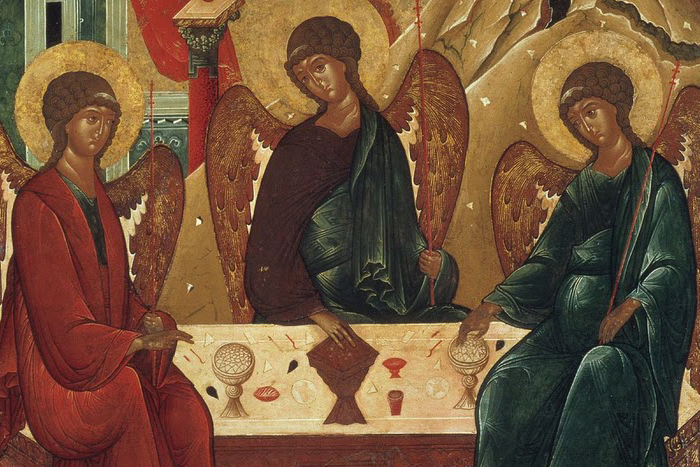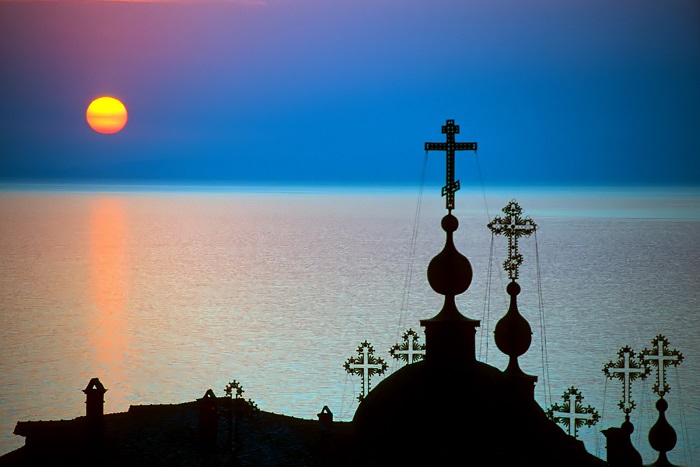
Perhaps the most scandalous doctrine of the Eastern Orthodox Church for heterodox Christians is that of theosis, which is often translated as divinization. It is the means of salvation that has been taught since the time of the apostles, but most Christians have never heard of it, and even some Orthodox are unfamiliar with it.
BECOMING GODS
It is written, Ye are gods, in Psalm 81/82 and in 2nd Peter 1:4 we are called to be partakers in the divine nature. As I have written in the past, we cannot partake in the divine nature without either pulling that nature down to something less than divine or being elevated to it.
St. Athanasius states, The Word of God… assumed humanity that we might become God, [1] St. Macarius wrote that those Christians who struggle and conquer are kings and lords and gods [2], and countless other fathers from both East and West have taught this doctrine.
When mentioning this doctrine to pious, but ignorant Christians, shock is often the common reaction. On the other hand, those in the New Age movement quickly embrace the idea. But neither one of them rejects or embraces it for the right reason.
When we hear of becoming gods, our first idea is usually something akin to Mormonism in which there are countless gods and demigods who rule parts of the universe. For the well-intended ignorant Christian, it sounds as if we Orthodox are attempting to replace the one true God. For the New Age person, it sounds as if we are affirming their belief that they can do whatever they want because they won’t have to answer to anyone anyway. But neither case is true.
SLUGS AND DOGS
 Let us imagine that you want to find close companionship in an animal. What would happen if you selected a slug? Probably nothing much. It would never really interact with you, and it is nearly impossible to relate to.
Let us imagine that you want to find close companionship in an animal. What would happen if you selected a slug? Probably nothing much. It would never really interact with you, and it is nearly impossible to relate to.
Now, what if you chose a dog? You would find that close companionship is not difficult. Dogs are loyal, they have feelings, they enjoy our company, and we can relate to them, sometimes quite closely.
So, why does a dog make a better companion than a slug? Because ultimately dogs are more human-like than slugs.
In a similar manner, God wants deep communion and intimacy with us humans. While we will never be an uncreated, self-existing entity as God is, we can become more divine than we are now…much more! Just as we cannot experience intimate communion with a slug because it’s so radically different than us, so we cannot draw close to God if we have no likeness to His divinity. God calls us to be divine because that is the only way we can deeply experience Him.
For that cause, God became a man to unite our humanity to His divinity and begin the divinization process. Now, our humanity is intimately connected to the divine nature and is seated at the right hand of God. Through grace, we can become what He is by nature.
A DISCLAIMER
While we will become gods by His grace if we choose to work with Him in doing so, we will never usurp God’s divinity. As gods, our entire existence is still being borrowed from the self-existing One; there remains a distinct contrast between the created and the uncreated.
The Eastern Orthodox explain it this way: the Father, Son, and Holy Spirit share one unknowable, divine Essence. This divine Essence cannot be seen, experienced, or intellectually perceived by any created creature. However, God’s divine Energies, which include things like love and grace, are part of God’s nature and it is to His Energies that we are united. [3]
THE PROCESS OF SONSHIP
While theosis is a gift of God’s grace, it still requires effort on our part. God becoming a man would be like man becoming a slug in order to teach other slugs how to be more human. But God in His love did that for us.
We are called to transform into God’s likeness, which can only be achieved by becoming as much like God as possible in this life. That is the reason that Christianity has so many “rules” or commandments. The Psalmist understood that when writing Psalm 118 (119 in Protestant Bibles). In that Psalm we see a deep love for God’s commandments, statutes, judgments, laws — all of which are synonyms for the way God has given us to live. And all of these the Psalmist pursues with his whole heart even stating that they enlarge [his] heart (verse 32).
The Psalmist understood what many people misunderstand: God does not want us to follow arbitrary rules, and He is not trying to ruin our lives by taking away our fun. He is laying out the path of salvation saying, “You are spiritual slugs covered in icky, gooey sin. I have laid out the path of divinity for you, becoming a man Myself, so that you can become like Me and be united to Me. You cannot ever do that if you are content to be a slug. However if you will follow the ways that I have shown you, then you will be slowly transformed from slugship to sonship.”
THE IMPOSSIBILITY OF IT
The catch is that following the commandments of the New Testament with love and humility is actually quite impossible. The harder we try, and the more we become aware of our true selves beyond the mask of the ego (beyond the “shadow self”), the more we will realize how far short we fall.
That epiphany of our disparity between our present state and our true calling is an important moment. For one who realizes his true state will call upon God with a humility that cannot be taught. Such a person will understand that the transformation from slugship to sonship requires crucifixion and death. God has not called us merely to improve, but to die and resurrect as something else.
Crucifying this old self and the awakening are both processes, ones that we must patiently walk day by day. How do we do it? The Church provides us with grace through the mysteries (sacraments), and guidance in our daily life with readings, the cycle of services, the fasting periods, and the “rules.”
Glory to God for providing the way of salvation and the means to attain it! Eye hath not seen, nor ear heard, neither have entered into the heart of man, the things which God hath prepared for them that love him. (1 Cor 2:9)
[1] St. Athanasius On The Incarnation, paragraph 54.
[2] St. Macarius The Fifty Homilies, Homily 27.
[3] These Energies are an uncreated part of God’s nature, and our union with them is union with God Himself.




GOD can only give the gift of theosis if we humble ourselves enough so that HE can tolerate being in our presence. LORD JESUS CHRIST, SON OF GOD, HAVE MERCY ON ME A SINNER!!!